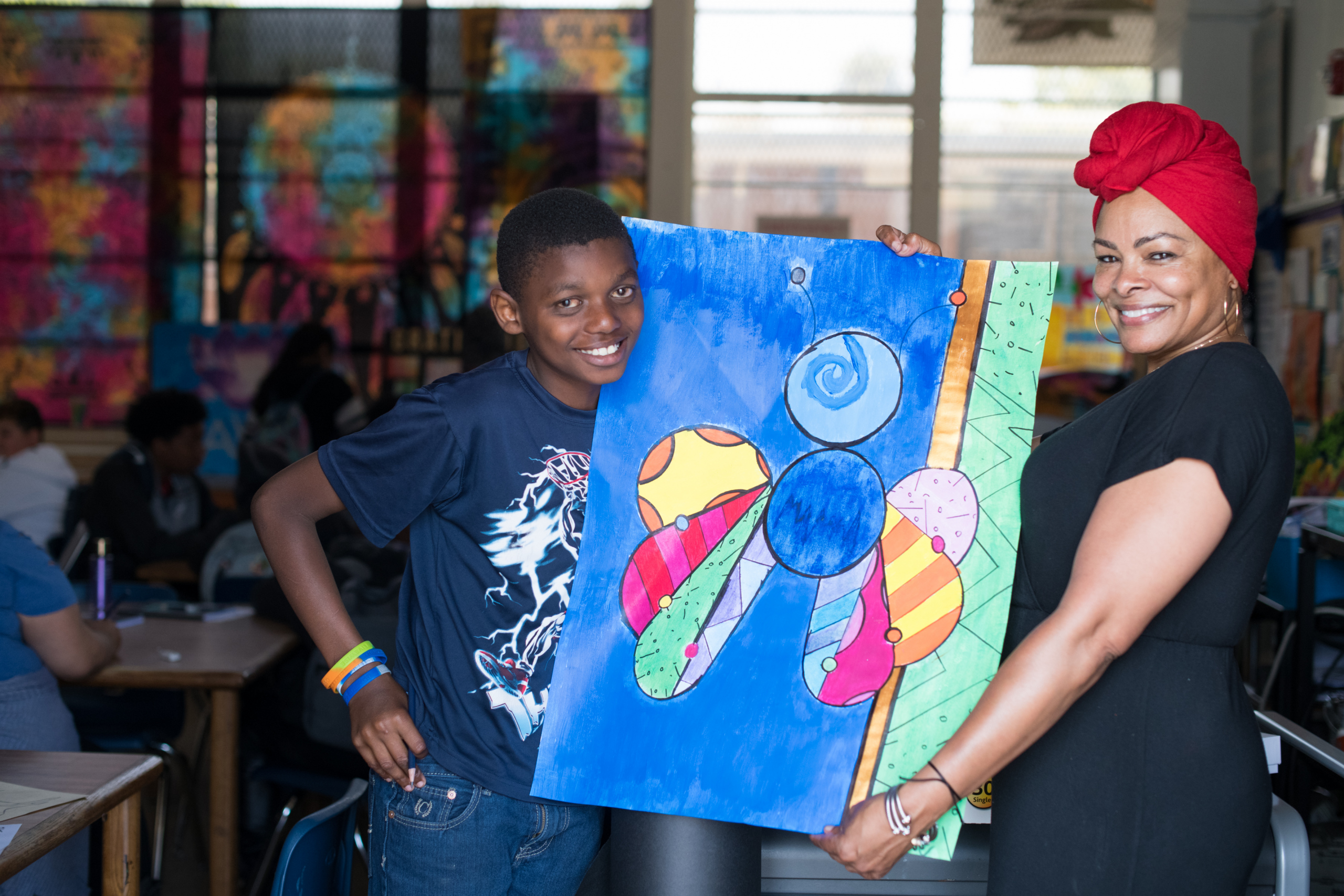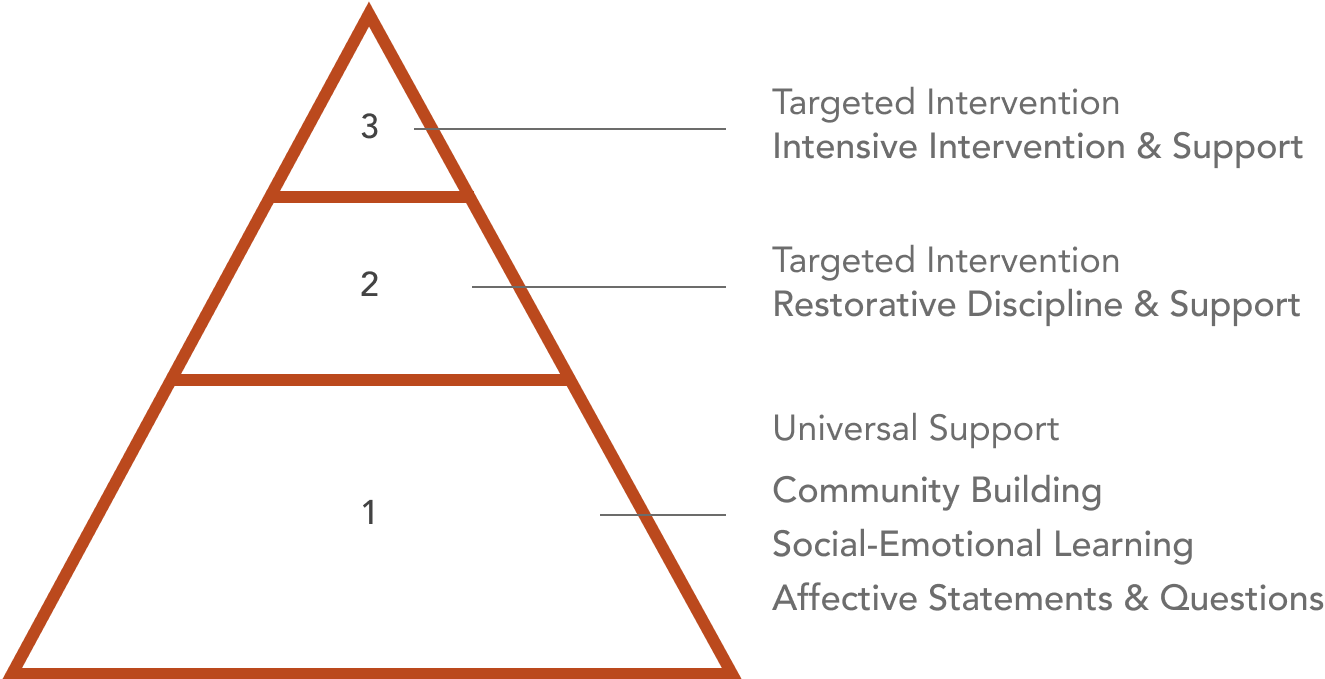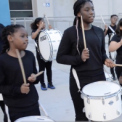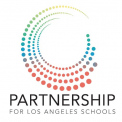
School Culture
inside our Practice
We believe that school culture is the foundation of teacher effectiveness and student achievement.
The Partnership’s vision for healthy school cultures integrates restorative practices, a culture of college completion, social-emotional learning, trauma-informed practices, culturally and linguistically responsive teaching, and arts-rich schools. We support systems-building at school sites to create and sustain restorative communities that promote an overarching belief in adults and students alike that college completion is the north star.
Our School Culture priorities are in service of strengthening student outcomes by:
- Improving attendance
- Reducing chronic absenteeism and discipline referrals for harm
- Increasing students’ feelings of safety, happiness, and orientation toward their futures
- Increasing college-going and completion rates
The Partnership’s vision for healthy school cultures integrates restorative practices, a culture of college completion, social-emotional learning, trauma-informed practices, culturally and linguistically responsive teaching, and arts-rich schools.

COLLEGE COMPLETION CULTURE
As we head into our second decade of school transformation in Los Angeles, one of our most immediate goals is to increase the number of Partnership seniors accepted into and completing four-year college.
Research shows that in today’s economy, the percentage of jobs that require postsecondary education has doubled compared to the past 40 years, and that low-income students are finding it harder and harder to compete: only 10% of individuals from low-income families have a bachelor’s degree by age 25. When children born into low-income families get a college degree their chances of making it to the top income brackets quadruples.
What Sets the Partnership Approach Apart
In many large districts across the country, counselors are a very scarce resource and must be allocated to support students in crisis due to homelessness, mental health issues, or exposure to violence and other traumas. In LA Unified, we know that despite the fact that counselors do meet with students to review college entrance requirements, ¼ to ⅓ of students report that they do not know the courses they need to take or whether or not they’re on track for college.
When we started focusing on college years ago, we encouraged our schools to build college recognition by displaying banners and pennants and naming classrooms after colleges. But there were few visible signs of students accessing curricula through a lens of college culture in elementary and middle schools. The Partnership now takes a different approach:
We focus on college culture across the entire TK-12 span. We recognize that the work to support students to be college-completing is just as important in 1st grade as it is in 11th.
We partner with our schools’ Restorative and College Culture Leads (RCCLs) to focus on the work TK-12, and with our counselors in 11-12, to elevate college-completion culture as an important element of our approach to creating restorative communities and healthy school culture.
Learn More:
College Compass – A Partnership for Los Angeles Schools Initiative
restorative communities
Restorative Communities promote a positive and healthy school culture by building, strengthening and (when harm occurs – including institutional and historical harm) repairing relationships through social-emotional learning, circle practice, and restorative dialogue.
Topics covered in schoolwide professional development sessions include:
- Social-Emotional Learning (SEL)
- Trauma-Informed Practices
- Re-entry Restorative Practices
- Tier 2 and 3 Supports
- Power, Control, Legitimacy and Culturally Responsive Teaching
- Adult Beliefs & Mindsets
- Restorative Circle Practices
At the core of building a strong school culture is the development of restorative communities that create environments conducive to learning and achievement.
We cultivate schools and classrooms to be restorative communities that help students feel safe physically, intellectually, and emotionally; that share decision-making power with those who are most impacted; that welcome families and community organizations as partners; that celebrate identity and promote social and racial justice; and that ultimately build on the vision of all students completing college.
What Sets the Partnership Approach Apart
The Partnership organizes its Restorative Communities work on a tiered continuum, and works closely with school teams to set schoolwide culture goals and implementation plans that address the specific needs of each school. Our framework for implementation is distinct from a traditional district approach because:
We prioritize use of restorative practices instead of traditional disciplinary methods. One example of this is the regular use of restorative circles across our network. We incorporate this indigenous practice into our work to facilitate the development of strong, trusting relationships that allow us to work together in a transformational, rather than transactional way.
We offer formal professional development opportunities focused on restorative strategies.
With our support, Restorative & College Culture Leads (RCCLs) coach and support teachers and school leaders at their site on practices that facilitate restorative environments.
We provide technical assistance and thought partnership to build strong systems to support school culture at each of our school sites.
We manage all supports for school sites related to the adoption and development of restorative practices.
Areas of Focus

To help build restorative communities in schools and align our leadership development programs with our site-based support, we facilitate formal professional development opportunities for school and teacher leaders to develop strategies to build the capacity of all teachers and staff, families, and community partners to model restorative practices, including de-escalation and developing socio-emotional skills in students. The Partnership team has extensive experience to facilitate professional learning, coaching, and technical and adaptive support across the network, and tailors its approach to meet the specific needs of each school site.




